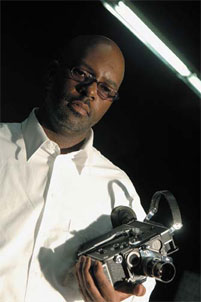| Solving the college mystery | Entrepreneurs extraordinaire | Ivy League Maverick |
| Home Forethought Campus Buzz Feature Stories Re:Search The Score Alum News Yesteryear | ||
Narcel Reedus vividly remembers the first movie he saw. He was 6 or 7 and living in Gary, Ind. He and his classmates boarded a bus for Chicago, where they watched Sounder.
 |
| Award-winning filmmaker Narcel Reedus is the film program's newest faculty member. |
"To sit in that dark theater with images that were so large was powerful. I had never experienced that before, and the fact that the larger-than-life images were black people made it even more powerful."
Reedus, now a UT Arlington assistant professor, didn’t decide to be a filmmaker right then; he didn’t know such a thing was possible. Yet the seeds planted that day grew with exposure to groundbreaking works like Shaft.
Spike Lee was another influence, especially his independent film She’s Gotta Have It, released in 1986. By then, Reedus was in his late 20s and living in Atlanta. He had dropped out of Morris Brown College a couple of years short of getting his communications degree.
"I was just hanging out," he said. "Then this film ignited something in me. Not the film itself, as much as all the hype about independent black filmmaking."
Reedus points out that Spike Lee graduated from Morehouse College in Atlanta, then went to New York University Film School. He raised the money for the film, and he made the film.
About this time, Reedus’ mother had a stroke. He was devastated, yet he felt a push to move forward, to do something with his life. He enrolled in Georgia State University’s new film program.
"I really got into it," he said. "I was consumed by film."
He became a full-time student and, to pay for it, a full-time waiter. In the few hours he could steal away from these pursuits, he took film classes at nearby universities Spelman and Mercer, as well as at Atlanta’s IMAGE Film & Video Center.
"I had never experienced that kind of dedication to anything before. Once you are on that level of consciousness about what you are doing, you just do it, no matter how tired you get."
The early ’90s was a magical time for black artists in Atlanta with a convergence of writers, actors, musicians, playwrights and filmmakers into an informal alliance. After earning his degree in 1991, Reedus produced an award-wining short documentary, Waddie Welcome, and wrote scripts for the Peabody Award-winning radio documentary Will the Circle Be Unbroken.
In 1999, the year that the prestigious Southern Circuit selected his short film For Colored Boys Who’ve Considered Homicide for a nine-city tour, Reedus was recruited to teach at Clark Atlanta University. He began to envision using academia as a base for independent film production, but he lacked the master’s degree required to join the faculty full time.
In 2000, 10 years after her stoke, his mother died. Just as before, the tragedy propelled Reedus, this time to Temple University Film School, where he earned his master of fine arts. His thesis, a feature-length script for Race Juice: An Elixer for the Soul, won the Ben Lazaroff Screenwriting Award.
It’s the script he plans to make into his first full-length feature in the near future, now that he has settled into his academic life at UT Arlington.
— Sue Stevens
| Archives
| Alumni Association |
Giving to UTA | UTA
Home Copyright © 2005 UTA Magazine. All rights reserved. |
